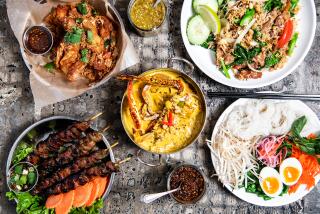‘Top Chef’ shows it has the recipe for success

Any number of television’s competition shows seem to take special — perhaps sadistic — pleasure in dispatching their also-rans to reality’s netherworlds. “The Apprentice” sends the defeated off with “You’re fired!,” the vanquished in “Survivor” have their torches snuffed out and the unlucky in love on “The Bachelor” are left without a single red rose.
“Top Chef” has its own exit strategy — “Please pack your knives and go,” host Padma Lakshmi gently tells the culinary castoffs — but like the small group of reality shows that celebrate artistry more than delight in failure, the cooking series succeeds best when its contestants excel at the task at hand. Tellingly, the single episode from “Top Chef All-Stars” that the show’s producers submitted for this year’s Emmy Award concluded with an exceptional twist — not a single chef was sent home.
In last year’s awards, Bravo’s “Top Chef” registered a huge upset in the reality-competition match, knocking off CBS’ “The Amazing Race” after it had won in the category for seven consecutive years. Convinced they would be bridesmaids again, many of “Top Chef’s” key creative talent didn’t even attend last August’s ceremony. “We thought there was no way we were going to win,” said head judge Tom Colicchio. “We were all really surprised.”
Perhaps they shouldn’t have been.
Measured by the quality of its cuisine and the originality of its gastronomic challenges, the seventh season of the cooking show was certainly its most distinguished. Viewers may have been transfixed by brothers Michael and Bryan Voltaggio squaring off in the Napa Valley finals, but that familial duel often was a mere amuse bouche to the entrée of consistently excellent preparation, all of it scored by “some of the top chefs in the world as guest judges,” said Jane Lipsitz of production company Magical Elves.
“Top Chef” has done well enough in the ratings and in popular culture that it has spun off in numerous directions: There’s “Top Chef: Just Desserts” and “Top Chef: Masters,” a planned “Top Chef Juniors,” several “Top Chef” cookbooks, a board game, knife sets and aprons.
In the recently concluded eighth season of “Top Chef,” the show for the first time created an all-star hybrid. It’s a realm that lies halfway between the regular competition, largely populated with up-and-coming chefs (some of whom can scarcely fillet a fish), and its spinoff “Top Chef Masters,” which features established luminaries operating at the highest end of cooking.
By picking only highly placed runners-up from its earlier seasons, the makers of “Top Chef All-Stars” risked creating something that was neither fish nor fowl: There might be no epic flameouts, as is the case in the regular “Top Chef,” nor the kind of eye-popping virtuosity that’s a staple of “Top Chef All-Stars.”
It didn’t turn out that way.
“The atmosphere was different on set — there was a familiarity,” Lakshmi said. “But that did not affect the intensity of the competition. In fact, the opposite was true. It only ramped it up.”
The “Top Chef” production team created in the all-star season a series of challenges that, while sporadically ridiculous (preparing a dish from ingredients found in a ferry boat snack bar; cooking only with food and implements in a Target store), were generally designed to force the chefs to “get over a hurdle and do something amazing,” said executive producer Dave Serwatka from Bravo. “We want to see excellence — and we want the audience to root for excellence — in the show,” he said.
Memorably, the chefs had to crank out dim sum for a restaurant full of increasingly cranky elderly diners, create a family-style meal at Rao’s, a landmark Italian restaurant in New York, and — in the episode selected for Emmy consideration — travel to Ellis Island to prepare a meal for a relative and the judges that reflected their ancestry.
Competitors on “Top Chef” are constantly forced to work outside their comfort zones — the cook who usually serves fish must make a pie, the Southern chef is obliged to work with Asian ingredients and so on. In the Ellis Island excursion, the chefs were asked to do the opposite and fully embrace their own ethnicity in their cuisine.
It was also in that episode that the Italian American chef Mike Isabella began cooking food that he had grown up with but had largely shunned making himself for fear it would remind him of — and not measure up to — his late grandmother. Isabella’s gnocchi that night, Lakshmi recalled, “were unbelievable.” The other remaining chefs didn’t do so badly either, as the judges decided their food was so consistently good that no one deserved to be exiled. “That wasn’t planned,” Colicchio said. “It just happened organically.”
Of course, as a competition show, there had to be a champion, with the increasingly self-doubting Richard Blais prevailing over Isabella. But like so much of the season, if felt like someone won, rather than someone else losing. “You want to give them every opportunity to do well,” Lakshmi said of the chefs. “We don’t want them to fail.”
More to Read
The biggest entertainment stories
Get our big stories about Hollywood, film, television, music, arts, culture and more right in your inbox as soon as they publish.
You may occasionally receive promotional content from the Los Angeles Times.







